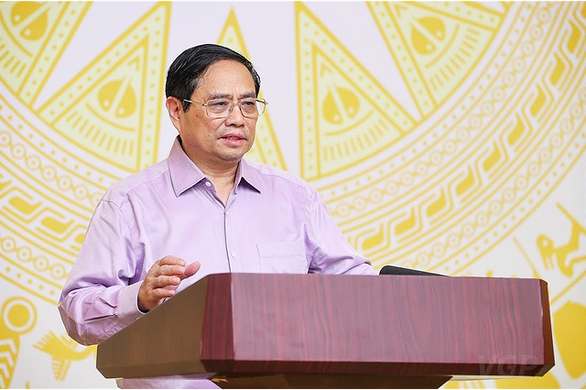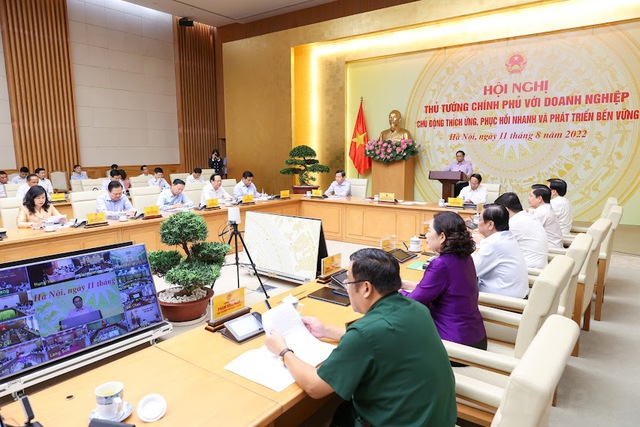PM urges favorable environment for businesses
A strong business community will build an independent and highly resilient economy.
Localities are expected to further create a favorable environment for business operation, especially in simplifying administrative formalities and avoiding petty corruption.
| Prime Minister Pham Minh Chinh at the conference. Photos: Nhat Bac |
Prime Minister Pham Minh Chinh stressed the view during a conference between the Government’s leader and business community on August 11, which drew the participation of 1,200 delegates from a business association and local companies.
According to Chinh, more than two years since the outbreak of the Covid-19 pandemic, Vietnam has now put the situation under control and maintained positive growth.
Vietnam’s GDP during the six months expanded by 6.42%, higher than the 5.74% rate in the same period last year, and equivalent to the growth rate recorded in the pre-pandemic period 2016-2019 (6.38%).
In addition, Chinh also pointed out high budget revenue, positive trade surplus, and stable labor market.
“This is nevertheless not to underestimate issues that the business community is facing,” Chinh said, referring to many who are still struggling with the Covid-19 impacts, not to mention emerging challenges from tensions between world powers, the Russia-Ukraine conflict, and rising inflationary pressure.
“The Covid-19 response policies from some countries have also had negative impacts on Vietnam’s economy,” he added.
“The main goal for Vietnam is to continue ensuring macro-economic stability, balances and containing inflation,” Chinh said.
Due to Vietnam's high level of economic openness, even a small external problem can have a big impact on Vietnam's economy, for which the Government prioritizes promoting an independent and highly resilient economy.
“Enterprises development is a must to realize these goals,” Chinh said.
For the coming time, Chinh noted the Government is committed to supporting businesses, stabilizing macroeconomic conditions, and containing inflation.
He stressed the necessity to ensure the healthy and sustainable development of capital, real estate, and labor markets.
“The Government urges all localities to review all issues concerning businesses and address them,” he continued.
Among key measures to boost growth, Chinh expected a greater pace in disbursement of public investment funds, which would serve as the foundation to further attract private funds into infrastructure development.
| Overview of the conference. |
Lack of working capital
Vice Secretary of the Vietnam Association of Seafood Exporters and Producers (VASEP) Nguyen Hoai Nam suggested a stable macroeconomic environment is essential for growth.
Nam said Vietnam’s seafood exports of $6.7 billion during the first seven months of 2022 and expected the figure would surpass $10 billion this year.
The challenge, however, continues to be the rise in prices of animal feed by over 20% and its impacts on businesses.
He also expressed concern over the fact that banks have now tightened loans as the majority have used up their credit quota, causing difficulties for businesses to expand operations.
Sharing Nam’s view, Chairman of Vietnam Association of Construction Contractors (VACC) Nguyen Quoc Hiep said many businesses are having difficulties amid rising prices of construction materials and a lack of working capital.
In this context, Hiep called for the Government to provide interest rate subsidy policies for construction companies.
Chairman of the Ho Chi Minh City Real Estate Association (HoREA) Le Hoang Chau noted a slowdown in the real estate market development, which comes from the fact that property developers are struggling to access banks’ loans.
Chau expected the Government to not overact in tightening credit in the real estate market and suggested the authorities enhance state management to ensure the capital is being used for the right purpose.
The textile industry is also facing a similar issue as mentioned by the Vice Chairman of the Vietnam Textile and Apparel Association (VITAS) Truong Van Cam.
In the first seven months of 2022, Vietnam’s garment exports rose by 16% year on year to $26.5 billion.
Cam noted the export target of $42 billion for the industry is attainable but would require the Government’s support to address issues related to working capital.
This is especially important as many have seen their financial capability severely affected following two years of fighting the Covid-19 pandemic.
On this issue, Governor of the State Bank of Vietnam (SBV) Nguyen Thi Hong noted the main objective of monetary policy management is to contain inflation and stabilize macroeconomic conditions.
“Credit growth management, therefore, should be in line with the above targets,” she said.
Hong, however, said the central bank would provide an additional credit quota for banks with strong business performance and ensure the credit growth target for this year at 14%.














